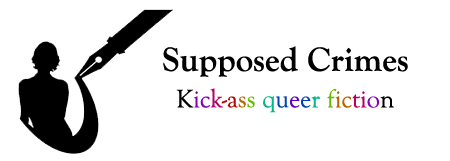
Happy New Year! 2017 was a heck of a ride. Here's hoping 2018 sees some improvements.
On that front, let's talk politics. No, not so much about the current state of the US government but on a more everyday level. How much is too much to incorporate into a novel? How do authors (and readers) balance political views with the books we write (and consume)?
There are no easy answers, and it obviously varies from person to person. Some people will say that books are an escape and no place for politics. Others will point out that literature has always trained its critical eye on society.
When it comes to LGBTQ+ books, it's already political the minute the first words appear on the page. To write about the joy, pain, pleasure, struggle, love, frustration, and even ordinariness of queer lives is to take a stand. For many of us who are part of the community, writing is a way of planting our rainbow flag and making our presence known. For our allies, it can be a way to indicate being firmly in our corner. For all of us, it tells the world we won't return to pre-Stonewall silencing.
Reading can be an act of defiance as well. When I was a teenager, I was deeply immersed in an environment where some things were taboo. I can recall reading The World According to Garp, by John Irving, and the feeling of exhilaration at taking in something of which my community disapproved. (For those who haven't read it, the book is one of very few at the time it was written which included a positive portrayal of transgender characters as well as both celebrating and critiquing feminism; it's quite a book and well worth the read.)
Speculative fiction is built on politics and social issues. These may be overt or more subtle, but even the ideas of cool technology or people who can turn into beasts carry connotations about real-world situations.
So how much is too much? Is it when the author's views become apparent in the story? Or when the metaphor is too obvious? Does it depend on the story and how well the author tells it?
As real-world politics become increasingly tense, we need books more than ever. The media we create can inform and inspire the public, driving change.
What do you think about books as political tools?
